The last man to do National Service
- Published
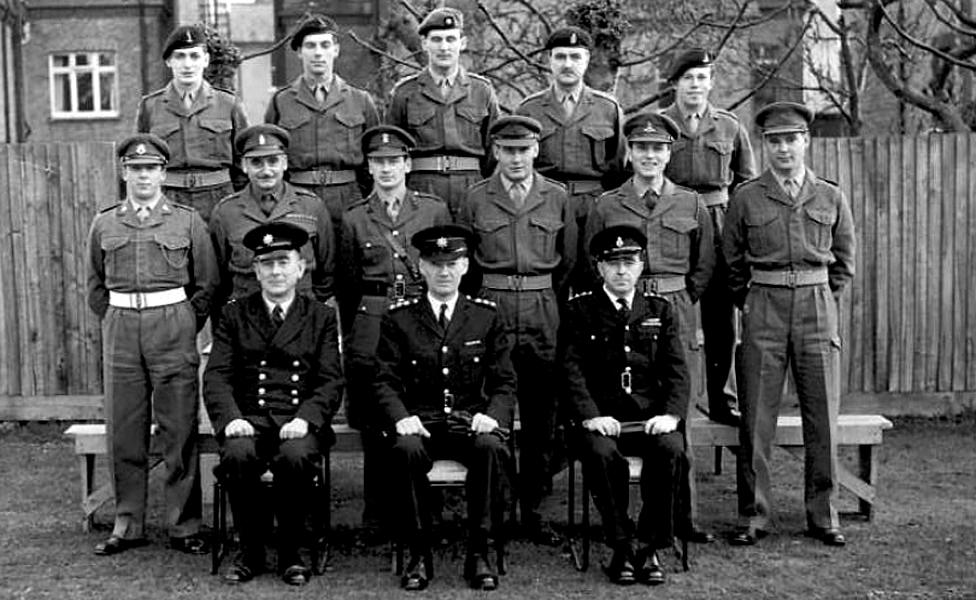
Richard Vaughan (second row, second from right) during his National Service 1961
Prince Harry recently called for National Service to be reintroduced, but would that be a good idea? Chris Stokel-Walker meets the last man officially discharged from National Service, 52 years ago.
Richard Vaughan was a fresh-faced 22-year-old when he was posted to the Royal Army Pay Corps' barracks at Devizes in Wiltshire on 17 November 1960.
Vaughan had just completed his exams, and with 162 others made up No 277 National Service Intake, the last group compelled to undergo National Service with the RAPC.
At 22, Vaughan was four years older than some of the other men he lined up with at Devizes. Like many in his unit, he had been granted a deferment to pass his exams to become a chartered accountant. Now 77, and running his own accounting firm in Bromley, Vaughan often looks back at the effect National Service had on him.
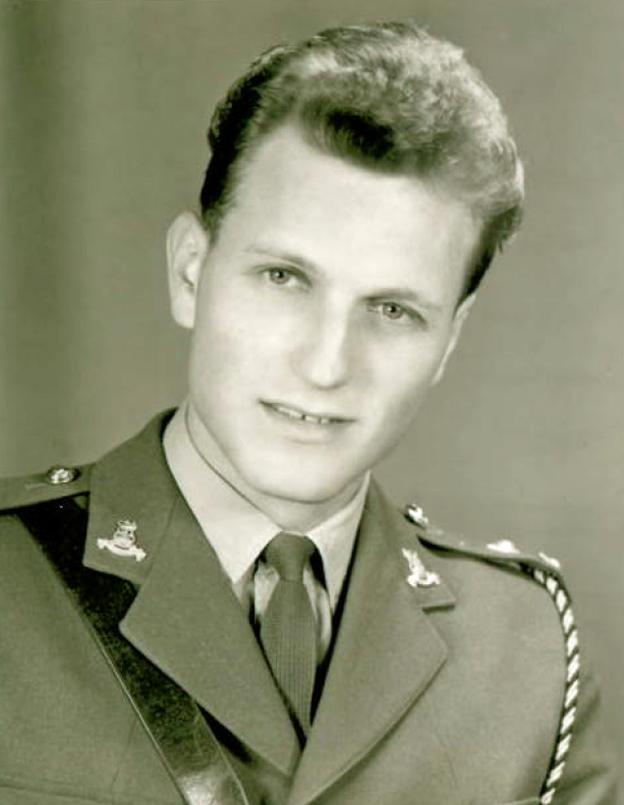
Richard Vaughan in military uniform
"Without experiencing what life would be like without going into the services, I can't say whether it changed me," he admits. "But it certainly opened your eyes to a completely different existence to working nine-to-five in an office. I would've got a nice job in commerce or industry. I was qualified. That was the biggest blow - I wasn't able to cash in on my qualification."
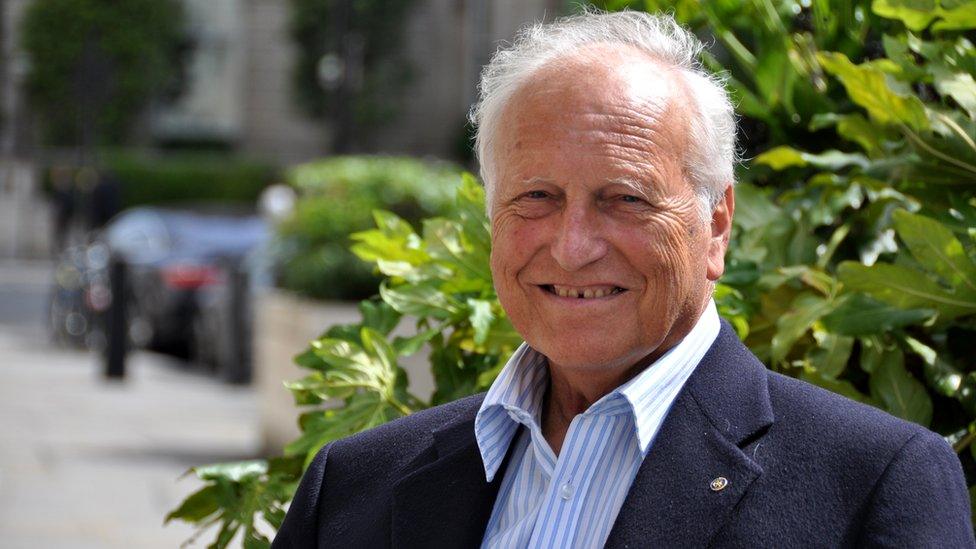
Richard Vaughan today
Most men, Vaughan included, took the posting in their stride. "I didn't come across many people who said: 'If I wasn't in here I could be this, that or the other'," he admits. "That didn't come into it. Most of our guys said, 'Well we're lumbered, we've got to make the best of it; let's enjoy it as best as we can.'"
Some soldiers-to-be were less happy - particularly those who were newly married, taken away from their wives for two years. "We bowled in wondering what was going on," Vaughan says. "It was a bit of an adventure."
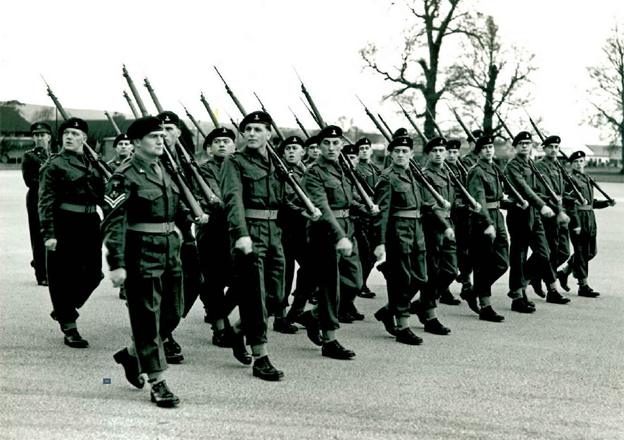
1961: Passing out parade for 18 Platoon RAPC/TC (Vaughan front row, second left)
National Service was introduced in 1939, as Britain entered World War Two, to redress a shortage of soldiers. Single men aged between 20 and 22 were called up to service, though the age range was extended to all men aged between 18 and 41 within a few months. In 1942, women between 20 and 30 were added to the list of those who could be conscripted, and the upper age range for men was extended to 51, all in the cause of fighting the world war.
Once the war was over, National Service remained. Men between 17 and 21 had to spend a year and a half in the armed forces to undergo training, and could be called up to war if needed for four subsequent years. By the 1950s, National Service took men into training for two full years. Nearly two million went through it.
"It served different purposes at different times," explains Richard Vinen, a historian at Kings College London, and author of a book on National Service in the post-war years. "Initially it was to train soldiers as a reserve force, and then it was to have them ready for immediate deployment, and then it was for colonial warfare."
By 1957, the process was winding down gradually. According to records collated by the Imperial War Museum, Richard Vaughan, by May 1963 a lieutenant with the Royal Army Pay Corps, was the last National Serviceman officially discharged from duty. (Vaughan is wary of saying that he is anything other than "the official last demobbed person" - he believes that other servicemen being treated in hospital, for example, could have been demobilised after he was.)
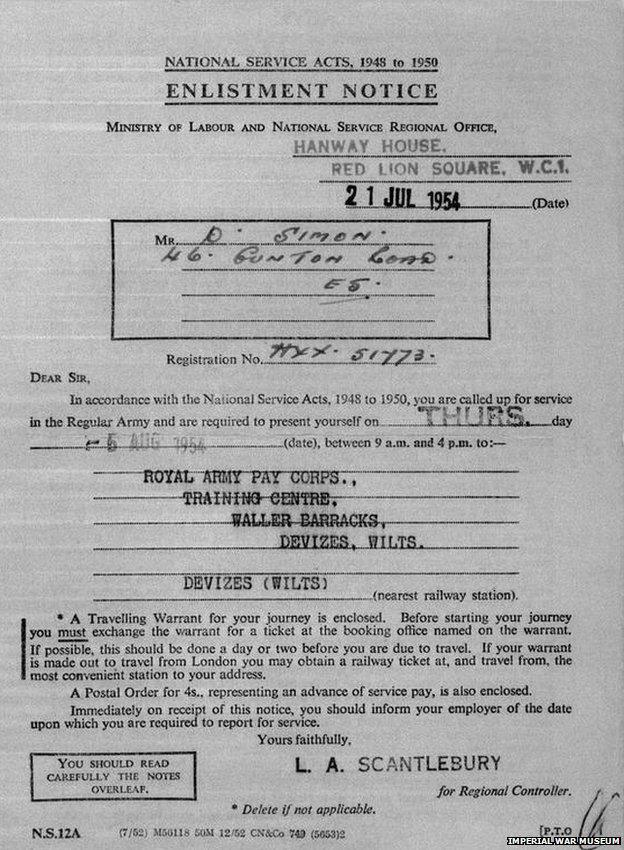
A call-up letter dated 1954
National Service was no longer needed. Birth rates had increased, but more than that war was changing - becoming increasingly technological. The forces needed professional soldiers with advanced skills - not conscripts who were often counting down the days until they went home.
"They didn't bring us in because the Cold War was still going on," explains Vaughan, "they brought us in because the law said to bring us in. When the Cold War was still roaring away, they stopped it. If conscription was still needed, why did they stop it?"
"It was also very unpopular," says Vinen. Banishing conscription was one reason of many that Harold MacMillan's Conservative party won the 1959 election in such big numbers.
National Service has been well represented in popular culture. In the 1990 film The Krays, Reggie Kray, played by Martin Kemp, tells his commanding officer that "you've got nothing to say and you're saying it too loudly", before deserting. The real Krays were indeed called up in 1952, five years before conscription started to be wound down.
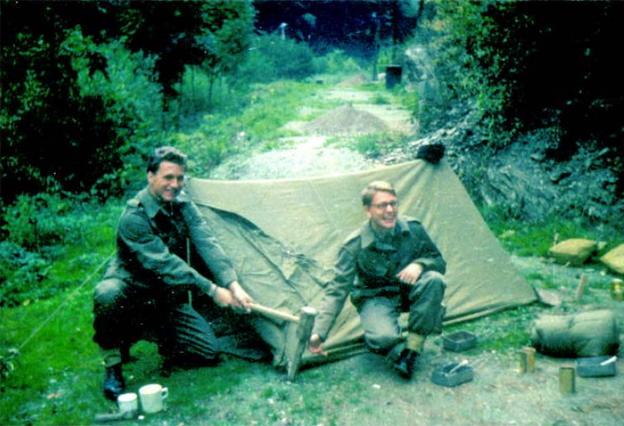
Vaughan (left) and friend assembling a tent
A less violent and more comic portrayal of conscription was the inept buffoonery of the servicemen in Carry on Sergeant, a 1959 film that lampooned National Service.
But the very words continue to have political resonance. The idea of bringing back some form of National Service has been floated as a response to wayward youth on many occasions.
While the case for a form of military conscription seems far-fetched in an era when the professional armed forces are being cut, schemes for mandatory community work have been suggested. Former home secretary David Blunkett advocated a national volunteer service in response to the 2011 riots, suggesting: "It should become an integral part of growing up in Britain, a rite of passage into adulthood, just as National Service used to be for the 1950s generation."

National Service 1939-1960
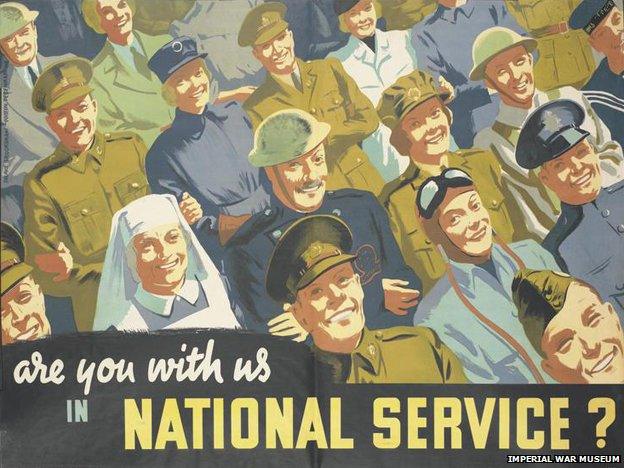
National Service (Armed Forces) Act 1939, introduced at the beginning of WW2, made all men between 18 and 41 liable for conscription (with exceptions for those in reserved occupations and for conscientious objectors)
National Service Act 1948 provided the framework for peacetime conscription - 17- to 21-year-old healthy men were expected to serve in the armed forces for 18 months and remain on the reserve list for four years; in 1950 the period of service was extended to two years
Conscription was phased out gradually from 1957; it was decided that those born on or after 1 October 1939 would not be required
Last men (including Richard Vaughan) entered service in November 1960

In the early 2000s, ITV ran several series of Bad Lads Army, which attempted to instil discipline in criminals by undergoing a month of basic military training.
The power of a period of compulsory service to shape young people still appeals. But the original National Service was not intended as a rite of passage or character-shaping exercise - it was purely military.
Many servicemen didn't make it to the front line, but instead spent their two years sitting around on army bases. Some fought in Korea, Kenya and Cyprus, though, and Vaughan made his way to Germany, where the building of the Berlin Wall kept him in post for six months longer than expected.
Vaughan doesn't believe compulsory National Service should be brought back. "It hits young people just when they are trying to make a career," he says. "It delays everything."
Vinen is more forthright. "It's very bizarre the way it gets discussed," he notes.
Some of the skills learned in the armed services are useful, Vaughan admits, but others aren't transferrable to civilian life. "It's a different world in the forces," he says. "It certainly was in the 1960s. Suddenly being whipped away for two years away from what you're doing, it might not be helpful."
Vaughan is also wary of how National Service would be presented. "You can have great times, but in what way would it be done now? Would it be a punishment?"
"Certainly the Army, Air Force and Navy wouldn't like at all National Servicemen coming back in because by the time they become trained and useful to them, they're going to go," says Vaughan. "They want people for a minimum of three years. They don't want loads of blokes thinking about when they're going to be demobbed."

More from The Magazine
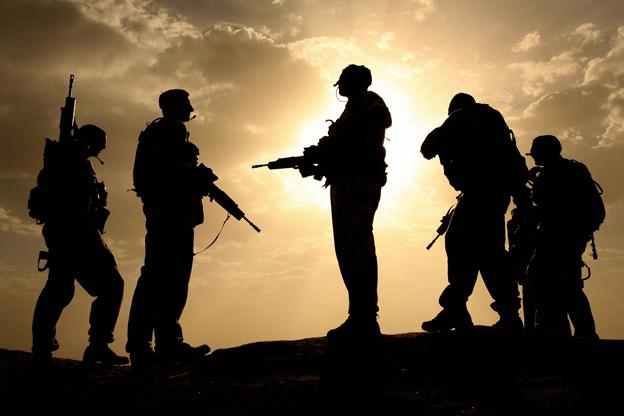

A serving soldier, who does not wish to be named, also points out that many in the armed forces oppose the concept because conscription could reduce the need for a professional fighting force.
And as to those who suggest that it could be used to bring wayward youngsters back on to the straight and narrow, Vinen isn't so sure. "It was never used for the purposes people think it would be used for now," he says. "People now say 'bad lads' and 'take boys off the streets', but the point is that when National Service was there, one of the reasons they needed it was to fill an army. Now we just don't need the soldiers."
Richard Vaughan was demobbed on 16 May 1963, flying back from Dusseldorf to London Gatwick with 50 demob-happy soldiers to a reception of popping flashbulbs from the nation's press. Everyone but him had passed out of the army in Germany - as an officer who wanted his flight home paid for, he decided not to elect for local release, and waited to report back to his depot to be taken off the register.
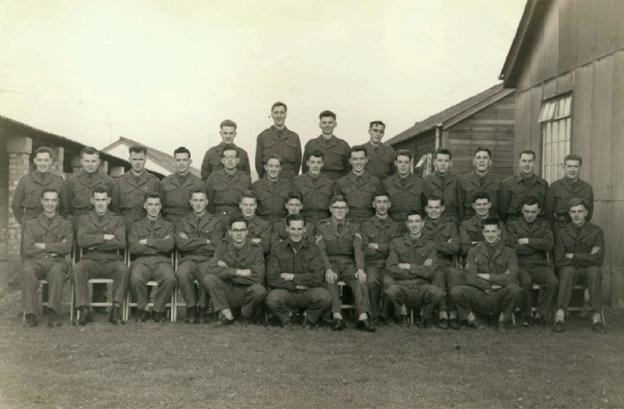
Richard Vaughan with his fellow conscriptees
"I was a chartered accountant, the world was open for me, and I didn't realise of course that I'd lost two years of experience," he explains. "Those chaps who were experienced in life were ahead of me. It took me a little while to catch up."
That doesn't mean Vaughan didn't like his time serving his country. "After I'd been demobbed for two or three months I did miss it a bit, but being a single chap with a car and a good job, it wasn't so bad."
That's not an unusual sentiment, says Vinen, who has interviewed dozens of ex-servicemen. "There are bits of National Service I think most men enjoy, and as the years go by people come to have a more favourable memory of it, just because one looks back on one's youth as something enjoyable."
The Ministry of Defence will only offer a short statement on the likelihood of conscription returning: "The government has no plans to reintroduce National Service."

Richard Vaughan today
Subscribe to the BBC News Magazine's email newsletter to get articles sent to your inbox.